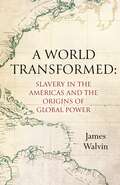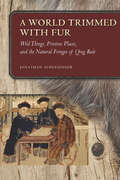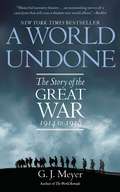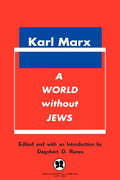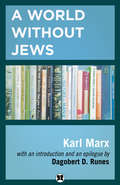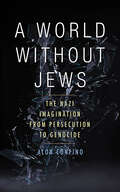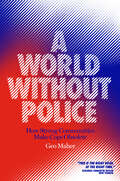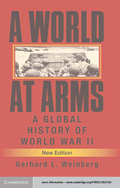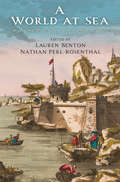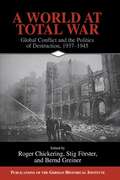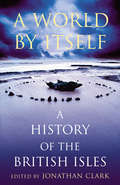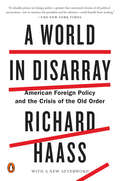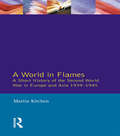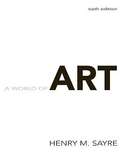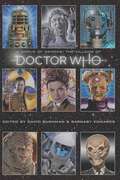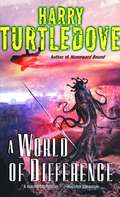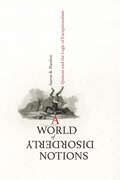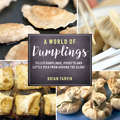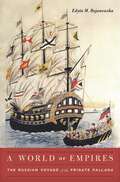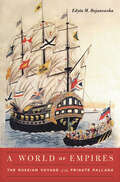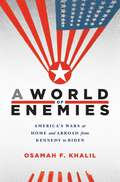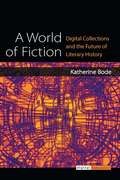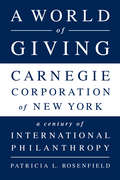- Table View
- List View
A World Transformed: Slavery in the Americas and the Origins of Global Power
by Professor James WalvinA World Transformed explores how slavery thrived at the heart of the entire Western world for more than three centuries. Arguing that slavery can only be fully understood by stepping back from traditional national histories, this book collects the scattered accounts of the most recent scholarship into a comprehensive history of slavery and its shaping of the world we know. Celebrated historian James Walvin tells a global story that covers everything from the capitalist economy, labor, and the environment, to social culture and ideas of family, beauty and taste.This book underscores just how thoroughly slavery is responsible for the making of the modern world. The enforced transportation and labour of millions of Africans became a massive social and economic force, catalysing the rapid development of multiple new and enormous trading systems with profound global consequences. The labour and products of enslaved people changed the consumption habits of millions - in India and Asia, Europe and Africa, in colonised and Indigenous American societies. Across time, slavery shaped many of the dominant features of Western taste: items and habits or rare and costly luxuries, some of which might seem, at first glance, utterly removed from the horrific reality of slavery. A World Transformed traces the global impacts of slavery over centuries, far beyond legal or historical endpoints, confirming that the world created by slave labour lives on today.
A World Transformed: Slavery in the Americas and the Origins of Global Power
by Professor James WalvinA World Transformed explores how slavery thrived at the heart of the entire Western world for more than three centuries. Arguing that slavery can only be fully understood by stepping back from traditional national histories, this book collects the scattered accounts of the most recent scholarship into a comprehensive history of slavery and its shaping of the world we know. Celebrated historian James Walvin tells a global story that covers everything from the capitalist economy, labor, and the environment, to social culture and ideas of family, beauty and taste.This book underscores just how thoroughly slavery is responsible for the making of the modern world. The enforced transportation and labour of millions of Africans became a massive social and economic force, catalysing the rapid development of multiple new and enormous trading systems with profound global consequences. The labour and products of enslaved people changed the consumption habits of millions - in India and Asia, Europe and Africa, in colonised and Indigenous American societies. Across time, slavery shaped many of the dominant features of Western taste: items and habits or rare and costly luxuries, some of which might seem, at first glance, utterly removed from the horrific reality of slavery. A World Transformed traces the global impacts of slavery over centuries, far beyond legal or historical endpoints, confirming that the world created by slave labour lives on today.
A World Trimmed with Fur: Wild Things, Pristine Places, and the Natural Fringes of Qing Rule
by Jonathan SchlesingerIn the eighteenth and nineteenth centuries, booming demand for natural resources transformed China and its frontiers. Historians of China have described this process in stark terms: pristine borderlands became breadbaskets. Yet Manchu and Mongolian archives reveal a different story. Well before homesteaders arrived, wild objects from the far north became part of elite fashion, and unprecedented consumption had exhausted the region's most precious resources. In A World Trimmed with Fur, Jonathan Schlesinger uses these diverse archives to reveal how Qing rule witnessed not the destruction of unspoiled environments, but their invention. Qing frontiers were never pristine in the nineteenth century—pearlers had stripped riverbeds of mussels, mushroom pickers had uprooted the steppe, and fur-bearing animals had disappeared from the forest. In response, the court turned to "purification;" it registered and arrested poachers, reformed territorial rule, and redefined the boundary between the pristine and the corrupted. Schlesinger's resulting analysis provides a framework for rethinking the global invention of nature.
A World Undone: The Story Of The Great War, 1914 To 1918
by G. J. MeyerThe First World War is one of history's greatest tragedies. In this remarkable and intimate account, author G. J. Meyer draws on exhaustive research to bring to life the story of how the Great War reduced Europe's mightiest empires to rubble, killed twenty million people, and cracked the foundations of the world we live in today.
A World Without Jews
by Dagobert D. RunesA World Without Jews by Karl Marx speaks about religious prejudice specifically against Jews. It begs to question can the world survive without this prejudice and how Jews beg for political emancipation?Karl Marx (1818-1883) is best known not as a philosopher but as a revolutionary communist, whose works inspired the foundation of many communist regimes in the twentieth century. It is hard to think of many who have had as much influence in the creation of the modern world. Trained as a philosopher, Marx turned away from philosophy in his mid-twenties, towards economics and politics. However, in addition to his overtly philosophical early work, his later writings have many points of contact with contemporary philosophical debates, especially in the philosophy of history and the social sciences, and in moral and political philosophy. Historical materialism -- Marx's theory of history -- is centered around the idea that forms of society rise and fall as they further and then impede the development of human productive power. Marx sees the historical process as proceeding through a necessary series of modes of production, culminating in communism. Marx's economic analysis of capitalism is based on his version of the labour theory of value, and includes the analysis of capitalist profit as the extraction of surplus value from the exploited proletariat. The analysis of history and economics come together in Marx's prediction of the inevitable economic breakdown of capitalism, to be replaced by communism. However Marx refused to speculate in detail about the nature of communism, arguing that it would arise through historical processes, and was not the realisation of a pre-determined moral ideal.
A World Without Jews
by Karl Marx Dagobert D. RunesLong available to the readers of Soviet Russia, here is the first English translation, in book form, of the unexpurgated papers of Karl Marx on the so-called "Jewish question." Most of Marx's anti-Semitic diatribes were carefully eliminated by the translators and editors of his books, his journalistic writings and his correspondence. Readers unfamiliar with this aspect of his thought will be startled to discover how well it has served the purposes of the totalitarian regimes of our time. It is consequently a subject upon which every member of a free society should be adequately informed. A fearless and illuminating critical introduction to this remarkable work has been provided by the eminent philosopher, Dagobert D. Runes. Extensive comments and critical annotations related to the material appear throughout the book.
A World Without Jews: The Nazi Imagination from Persecution to Genocide
by Alon ConfinoA groundbreaking reexamination of the Holocaust and how Germans understood their genocidal project: “Insightful [and] chilling.” —Kirkus ReviewsWhy exactly did the Nazis burn the Hebrew Bible everywhere in Germany on November 9, 1938? The perplexing event has not been adequately accounted for by historians in their large-scale assessments of how and why the Holocaust occurred. In this gripping new analysis, Alon Confino draws on an array of archives across three continents to propose a penetrating new assessment of one of the central moral problems of the twentieth century. To a surprising extent, Confino demonstrates, the mass murder of Jews during the war years was powerfully anticipated in the culture of the prewar years.The author shifts his focus away from the debates over what the Germans did or did not know about the Holocaust and explores instead how Germans came to conceive of the idea of a Germany without Jews. He traces the stories the Nazis told themselves—where they came from and where they were heading—and how those stories led to the conclusion that Jews must be eradicated in order for the new Nazi civilization to arise. The creation of this new empire required that Jews and Judaism be erased from Christian history, and this was the inspiration—and justification—for Kristallnacht. As Germans entertained the idea of a future world without Jews, the unimaginable became imaginable, and the unthinkable became real.“At once so disturbing and so hypnotic to read . . . Deserves the widest possible audience.” —Open Letters Monthly
A World Without Police: How Strong Communities Make Cops Obsolete
by Geo MaherIf police are the problem, what’s the solution? <p><p> Tens of millions of people poured onto the streets for Black Lives Matter, bringing with them a wholly new idea of public safety, common security, and the delivery of justice, communicating that vision in the fiery vernacular of riot, rebellion, and protest. A World Without Police transcribes these new ideas—written in slogans and chants, over occupied bridges and hastily assembled barricades—into a compelling, must-read manifesto for police abolition. <p><p> Compellingly argued and lyrically charged, A World Without Police offers concrete strategies for confronting and breaking police power, as a first step toward building community alternatives that make the police obsolete. Surveying the post-protest landscape in Minneapolis, Philadelphia, Chicago, and Oakland, as well as the people who have experimented with policing alternatives at a mass scale in Latin America, Maher details the institutions we can count on to deliver security without the disorganizing interventions of cops: neighborhood response networks, community-based restorative justice practices, democratically organized self-defense projects, and well-resourced social services. <p><p> A World Without Police argues that abolition is not a distant dream or an unreachable horizon but an attainable reality. In communities around the world, we are beginning to glimpse a real, lasting justice in which we keep us safe.
A World at Arms: A Global History of World War II
by Gerhard L. WeinbergThis major work is the first general history of World War II to be based both on the existing literature and on extensive work in British, American and German archives. It covers all the theatres of war, the weaponry used, and developments on the home front. Taking a global perspective, the work deals with all belligerents and relates events in Europe, Africa, the Middle East, South and Southeast Asia, and the Pacific to each other. The role of diplomacy and strategy, of intelligence and espionage, and the impact of war upon society are all dealt with, often on the basis of hitherto unknown material. New light is shed on the actions of great and small powers and on topics ranging from the beginning of the war to the dropping of the atomic bombs; the titanic battles on the Eastern Front are fitted into the war as a whole; the killing of six million Jews and millions of other civilians is placed into context; and the fighting at sea and in the air is included in a coherent view of the great conflict.
A World at Sea: Maritime Practices and Global History (The Early Modern Americas)
by Lauren Benton and Nathan Perl-RosenthalThe past twenty-five years have brought a dramatic expansion of scholarship in maritime history, including new research on piracy, long-distance trade, and seafaring cultures. Yet maritime history still inhabits an isolated corner of world history, according to editors Lauren Benton and Nathan Perl-Rosenthal. Benton and Perl-Rosenthal urge historians to place the relationship between maritime and terrestrial processes at the center of the field and to analyze the links between global maritime practices and major transformations in world history.A World at Sea consists of nine original essays that sharpen and expand our understanding of practices and processes across the land-sea divide and the way they influenced global change. The first section highlights the regulatory order of the seas as shaped by strategies of land-based polities and their agents and by conflicts at sea. The second section studies documentary practices that aggregated and conveyed information about sea voyages and encounters, and it traces the wide-ranging impact of the explosion of new information about the maritime world. Probing the political symbolism of the land-sea divide as a threshold of power, the last section features essays that examine the relationship between littoral geographies and sociolegal practices spanning land and sea. Maritime history, the contributors show, matters because the oceans were key sites of experimentation, innovation, and disruption that reflected and sparked wide-ranging global change.Contributors: Lauren Benton, Adam Clulow, Xing Hang, David Igler, Jeppe Mulich, Lisa Norling, Nathan Perl-Rosenthal, Carla Rahn Phillips, Catherine Phipps, Matthew Raffety, Margaret Schotte.
A World at Total War: Global Conflict and the Politics of Destruction, 1937-1945
by Roger Chickering Stig Förster Bernd GreinerThis volume presents the results of a fifth and final conference on the history of total war. It is devoted to the Second World War, which many scholars regard as the paradigmatic instance of total war. In considering the validity of this proposition, the authors address a broad range of analytical problems that this vast conflict posed in the arenas of Europe and Asia. They analyze modes of combat, war aims, the mobilization of economies and societies, occupation regimes, the vulnerability of noncombatants, and the legal and moral issues raised by the industrialized warfare of the mid-twentieth century. The volume will be of interest to all students of war and society in the modern era.
A World by Itself: A History of the British Isles
by Jonathan ClarkScholarship on the history of the British Isles is currently experiencing a golden age. The breakdown of modernism and the eclipse of both the Marxist tradition and the 'Whig interpretation' that sees all history as progress, combined with the trajectories of nationalism in Ireland, Scotland and Wales, have generated unprecedented intellectual activity. Nor has the world stood still: the collapse of communism, the issue of integration into the EU, and the advance of multiculturalism have led more and more people in the English speaking world as a whole to sense that their collective landscape now looks profoundly different from that inhabited by their ancestors even a few decades ago.In A World By Itself, six distinguished historians offer the most definitive and compelling history of the British Isles to date. Tracing the political, religious and material cultures from the Romans to the present day, this is at once an urgent reassessment of our shared past, and an inspirational celebration of British history. It focuses on the major themes and most dramatic moments of the last two millenia: the rise and fall of empires; reformation, revolution and restoration; wars both civil and global; and the enduring question of what it means to be British.
A World in Disarray: American Foreign Policy and the Crisis of the Old Order
by Richard HaassAn examination of a world increasingly defined by disorder and a United States unable to shape the world in its image, from the president of the Council on Foreign RelationsThings fall apart; the center cannot hold. The rules, policies, and institutions that have guided the world since World War II have largely run their course. Respect for sovereignty alone cannot uphold order in an age defined by global challenges from terrorism and the spread of nuclear weapons to climate change and cyberspace. Meanwhile, great power rivalry is returning. Weak states pose problems just as confounding as strong ones. The United States remains the world’s strongest country, but American foreign policy has at times made matters worse, both by what the U.S. has done and by what it has failed to do. The Middle East is in chaos, Asia is threatened by China’s rise and a reckless North Korea, and Europe, for decades the world’s most stable region, is now anything but. As Richard Haass explains, the election of Donald Trump and the unexpected vote for “Brexit” signals that many in modern democracies reject important aspects of globalization, including borders open to trade and immigrants. In A World in Disarray, Haass argues for an updated global operating system—call it world order 2.0—that reflects the reality that power is widely distributed and that borders count for less. One critical element of this adjustment will be adopting a new approach to sovereignty, one that embraces its obligations and responsibilities as well as its rights and protections. Haass also details how the U.S. should act towards China and Russia, as well as in Asia, Europe, and the Middle East. He suggests, too, what the country should do to address its dysfunctional politics, mounting debt, and the lack of agreement on the nature of its relationship with the world. A World in Disarray is a wise examination, one rich in history, of the current world, along with how we got here and what needs doing. Haass shows that the world cannot have stability or prosperity without the United States, but that the United States cannot be a force for global stability and prosperity without its politicians and citizens reaching a new understanding.
A World in Flames: A Short History of the Second World War in Europe and Asia 1939-1945
by Martin KitchenA concise account of the war - including the war in Asia and the Pacific as well as the European arena. Covers the formation of the victorious Grand Alliance and to the problems that beset it, and to Nazi Germany's relations with its allies.
A World of Art (Sixth Edition)
by Henry M. SayreWhy A World of Art? Henry Sayre wrote the first edition of World of Art because he wanted to use a text in his own art appreciation course that truly represented all artists, not just the Western canon found at that time in the other texts. He also wanted a text that fostered critical thinking through looking at, talking about, and questioning works of art for his students. We are proud to present the new sixth edition of World of Art, which further strengthens these two key aspects of the text while presenting hot topics like video and time-based media.
A World of Demons: The Villains of Doctor Who
by David BushmanThe first-ever essay anthology devoted solely to the villains the Doctor has encountered over the decades since Doctor Who's 1963 premiere -- including all of the usual suspects (Daleks, Cybermen, Weeping Angels, the Silence, etc.), plus plenty of surprises. &“One may tolerate a world of demons for the sake of an angel&”—Jean-Antoninette (&“Reinette&”) Poisson, aka Madame de Pompadour, &“The Girl in the Fireplace&” What a world of demons Doctor Who has presented us with over the past seven decades: from Daleks and Cybermen to Weeping Angels and the Silence, the greatest villains of the Who-niverse have achieved an iconic status all their own, cementing themselves in the minds of millions of viewers (why else would Parker Brothers have devised a version of Monopoly after them?). If, as the Seventh Doctor once said, "You can always judge a man by the quality of his enemies,&” the Doctor is great indeed, rescuing the universe time and again from some of the most formidable and terrifying villains in science fiction history. Now, for the first time, an entire anthology of essays is dedicated to deconstructing this gallery of blackguards. Who are the greatest Who villains of all time? Why are they so frightening? And—apologies to Shakespeare—what do they tell us about the villainy of our own fears? Featuring essays by Joseph Dougherty (executive producer, Pretty Little Liars; producer, thirtysomething), Steven Ashby, Anton Binder, Sarah Corey, Ken Deep, Jan Fennick, Hannah Friedman, Mark Givens, Nancy Hutchins, Jennie Jarvis, Don Klees, Chris Kocher, Robin Koman, Charles Martin, Michael Robinson, Steve Sautter, and Shane Thomas. Edited by David Bushman (Conversations with Mark Frost) and Barnaby Edwards (president, Doctor Who New York)
A World of Difference: A Novel
by Harry TurtledoveWhen the Viking lander on the planet Minerva was destroyed, sending back one last photo of a strange alien being, scientists on Earth were flabbergasted. And so a joint investigation was launched by the United States and the Soviet Union, the first long-distance manned space mission, and a symbol of the new peace between the two great rivals.Humankind's first close encounter with extraterrestrials would be history in the making, and the two teams were schooled in diplomacy as well as in science. But nothing prepared them for alien war -- especially when the Americans and the Soviets found themselves on opposite sides...From the Paperback edition.
A World of Disorderly Notions: Quixote and the Logic of Exceptionalism
by Aaron R. HanlonShortlisted for the Kenshur Prize for Best Book in Eighteenth-Century Studies from the Indiana University Center for Eighteenth-Century StudiesFrom Jonathan Swift to Washington Irving, those looking to propose and justify exceptions to social and political norms turned to Cervantes’s notoriously mad comic hero as a model. A World of Disorderly Notions examines the literary and political effects of Don Quixote, arguing that what makes this iconic character so influential across oceans and cultures is not his madness but his logic. Aaron Hanlon contends that the logic of quixotism is in fact exceptionalism—the strategy of rendering oneself an exception to everyone else’s rules.As British and American societies of the Enlightenment developed the need to question the acceptance of various forms of imperialism and social contract theory—and to explain both the virtues and limitations of revolutions past and ongoing—it was Quixote’s exceptionalism, not his madness, that captured the imaginations of so many writers and statesmen. As a consequence, the eighteenth century witnessed an explosion of imitations of Quixote in fiction and polemical writing, by writers such as Jonathan Swift, Charlotte Lennox, Henry Fielding, and Washington Irving, among others.Combining literary history and political theory, Hanlon clarifies an ongoing and immediately relevant history of exceptionalism, of how states from Golden Age Spain to imperial Britain to the formative United States rendered themselves exceptions so they could act with impunity. In so doing, he tells the story of how Quixote became exceptional.
A World of Dumplings: Filled Dumplings, Pockets, And Little Pies From Around The Globe
by Brian YarvinEver tried a Turkish borek? Swedish kroppkakor? How about Cajun meat pie? Acclaimed photographer Brian Yarvin has traveled to neighborhood kiosks, festivals, and restaurants in ethnic neighborhoods throughout the northeastern United States to bring more than 100 traditional dumpling and filled-pie recipes from places as near as Flushing, Queens, to as far away as Uzbekistan and beyond. Starting with the basics of dough making, steaming, and frying, Yarvin provides mouthwatering color photographs and step-by-step instructions so that anyone can recreate their grandmother's pierogi or street-food favorite at home, using ingredients from the local supermarket. Also included are tips for where to buy hard-to-find ingredients, and—if you just can't stand the wait of making your own—ethnic neighborhoods where you can find ready-to-eat dumplings.
A World of Empires: The Russian Voyage of the Frigate <i>Pallada</i>
by Edyta M. BojanowskaMany people are familiar with American Commodore Matthew Perry’s expedition to open trade relations with Japan in the early 1850s. Less well known is that on the heels of the Perry squadron followed a Russian expedition secretly on the same mission. Serving as secretary to the naval commander was novelist Ivan Goncharov, who turned his impressions into a book, The Frigate Pallada, which became a bestseller in imperial Russia. In A World of Empires, Edyta Bojanowska uses Goncharov’s fascinating travelogue as a window onto global imperial history in the mid-nineteenth century. Reflecting on encounters in southern Africa’s Cape Colony, Dutch Java, Spanish Manila, Japan, and the British ports of Singapore, Hong Kong, and Shanghai, Goncharov offers keen observations on imperial expansion, cooperation, and competition. Britain’s global ascendancy leaves him in equal measures awed and resentful. In Southeast Asia, he recognizes an increasingly interlocking world in the vibrant trading hubs whose networks encircle the globe. Traveling overland back home, Goncharov presents Russia’s colonizing rule in Siberia as a positive imperial model, contrasted with Western ones. Slow to be integrated into the standard narrative on European imperialism, Russia emerges here as an increasingly assertive empire, eager to position itself on the world stage among its American and European rivals and fully conversant with the ideologies of civilizing mission and race. Goncharov’s gripping narrative offers a unique eyewitness account of empire in action, in which Bojanowska finds both a zeal to emulate European powers and a determination to define Russia against them.
A World of Empires: The Russian Voyage of the Frigate Pallada
by Edyta M. BojanowskaThrough the lens of a classic Russian travelogue, this historical study examines early globalization and Russia&’s participation in the Imperial race. In the 1850s, American Commodore Matthew Perry embarked on a legendary expedition to open trade relations with Japan. Less well known is the Russian expedition that followed on his heels. Serving aboard the Russian Frigate Pallada was the novelist Ivan Goncharov, who turned his impressions into a bestselling book. In A World of Empires, Edyta Bojanowska uses Goncharov&’s travelogue as a window onto mid-19th century global imperialism. Goncharov recounts experiences in Africa&’s Cape Colony, Dutch Java, Spanish Manila, Japan, and the British ports of Singapore, Hong Kong, and Shanghai, offering keen insight on imperial expansion, cooperation, and competition. Often overlooked in the history of European imperialism, Russia emerges here as an increasingly assertive empire, eager to position itself on the world stage and fully conversant with the ideologies of civilizing mission and race. Goncharov&’s gripping narrative offers a unique eyewitness account of empire in action. Bojanowska&’s illuminating analysis reveals both a zeal to emulate European powers and a determination to define Russia against them.A Financial Times Best History Book of the Year
A World of Enemies: America’s Wars at Home and Abroad from Kennedy to Biden
by Osamah F. KhalilA sobering account of how the United States trapped itself in endless wars—abroad and at home—and what it might do to break free.Over the past half-century, Americans have watched their country extend its military power to what seemed the very ends of the earth. America’s might is felt on nearly every continent—and even on its own streets. Decades ago, the Wars on Drugs and Terror broke down the walls separating law enforcement from military operations. A World of Enemies tells the story of how an America plagued by fears of waning power and influence embraced foreign and domestic forever wars.Osamah Khalil argues that the militarization of US domestic and foreign affairs was the product of America’s failure in Vietnam. Unsettled by their inability to prevail in Southeast Asia, US leaders increasingly came to see a host of problems as immune to political solutions. Rather, crime, drugs, and terrorism were enemies spawned in “badlands”—whether the Middle East or stateside inner cities. Characterized as sites of endemic violence, badlands lay beyond the pale of civilization, their ostensibly racially and culturally alien inhabitants best handled by force.Yet militarized policy has brought few victories. Its failures—in Iraq, Afghanistan, US cities, and increasingly rural and borderland America—have only served to reinforce fears of weakness. It is time, Khalil argues, for a new approach. Instead of managing never-ending conflicts, we need to reinvest in the tools of traditional politics and diplomacy.
A World of Fiction: Digital Collections and the Future of Literary History (Digital Humanities)
by Katherine BodeDuring the 19th century, throughout the Anglophone world, most fiction was first published in periodicals. In Australia, newspapers were not only the main source of periodical fiction, but the main source of fiction in general. Because of their importance as fiction publishers, and because they provided Australian readers with access to stories from around the world—from Britain, America and Australia, as well as Austria, Canada, France, Germany, New Zealand, Russia, South Africa, and beyond—Australian newspapers represent an important record of the transnational circulation and reception of fiction in this period. Investigating almost 10,000 works of fiction in the world’s largest collection of mass-digitized historical newspapers (the National Library of Australia’s Trove database), A World of Fiction reconceptualizes how fiction traveled globally, and was received and understood locally, in the 19th century. Katherine Bode’s innovative approach to the new digital collections that are transforming research in the humanities are a model of how digital tools can transform how we understand digital collections and interpret literatures in the past.
A World of Giving: Carnegie Corporation of New York-A Century of International Philanthropy
by Patricia L. RosenfieldThe age of international philanthropy is upon us. Today, many of America’s most prominent foundations support institutions or programs abroad, but few have been active on the global stage for as long as Carnegie Corporation of New York. A World of Giving provides a thorough, objective examination of the international activities of Carnegie Corporation, one of America’s oldest and most respected philanthropic institutions, which was created by steel baron Andrew Carnegie in 1911 to support the "advancement and diffusion of knowledge and understanding. ” The book explains in detail the grantmaking process aimed at promoting understanding across cultures and research in many nations across the world. A World of Giving highlights the vital importance of Carnegie Corporation’s mission in guiding its work, and the role of foundation presidents as thought and action leaders. The presidents, trustees, and later on, staff members, are the human element that drives philanthropy and they are the lens through which to view the inner workings of philanthropic institutions, with all of their accompanying strengths and limitations, especially when embarking on international activities. It also does not shy away from controversy, including early missteps in Canada, race and poverty issues in the 1930s and 1980s related to South Africa, promotion of area studies affected by the McCarthy Era, the critique of technical assistance in developing countries, the century-long failure to achieve international understanding on the part of Americans, and recent critiques by Australian historians of the Corporation’s nation-transforming work there. This is a comprehensive review of one foundation’s work on the international stage as well as a model for how philanthropy can be practiced in a deeply interconnected world where conflicts abound, but progress can be spurred by thoughtful, forward-looking institutions following humanistic principles.
A World of Heroes
by Joint Association of Classical Teachers' Greek CourseA World of Heroes is a reader designed for students who have just completed an introductory course in ancient Greek and wish to read substantial passages of ancient authors in the original language. It introduces three of ancient Greece's most important authors, Homer, Herodotus and Sophocles, and includes such gripping and influential stories as the battle of Thermopylai (from Herodotus' Histories); the death of Hektor (the Iliad) and the fall of Oedipus. Notes accompanying each passage provide extensive help with vocabulary and translation, and each section contains a brief introduction to the author and his work. The first edition of the book proved very successful with students and instructors for more than three decades. This, the second edition, includes the same texts as the first but provides much more help with translating and understanding them in order better to meet the needs of modern students.
